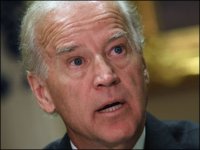Joe Biden and the dawn of the MediNet


Half of about $1.2 billion goes to 70 extension centers, modeled on agriculture extension services, that will educate doctors about electronic records so they not only buy gear that meets guidelines but learn to get value from it.
The other half goes to build state Health Information Exchanges (HIEs) to move records around when needed.
That leaves $18 billion, which will go to subsidize technology purchases under guidelines still being developed by the Department of Health and Human Services' (HHS) National Coordinator for Health Information Technology (NCHIT), David Blumenthal.
This is smart policy. The money for HIEs is in line with what the industry is already doing successfully. The extension centers are even smarter, because training is often overlooked in favor of marketing wherever tech products are sold.
Many press reports, however, tried to tie this directly to the President's ongoing efforts to pass health reform.
This is a completely different subject.
The entire health care industry -- insurers, hospitals, clinics, doctors, pharmacists -- has been trying to automate for over a decade. What the HITECH money does is completely in line with the industry's priorities, or at least buyers' desires.
All this money does is help assure the tech industry can achieve what its customers state as their goal, getting data where it's needed, eliminating paperwork, turning records into meaningful information. Where the savings go is another debate, one now taking place in the Congress.
HIEs work. As was true in the pre-Internet days of the 1980s the question is who pays for what. With $564 million in grants available those arguments can go away, replaced by questions like standards and interoperability, which are more important and useful.
Anyone who has come home from Best Buy with a $500 copy of Microsoft Office and a Dummies book will tell you how important training is, both before and after the sale. So $598 million is going into delivering something other than sales pitches and training that goes beyond what you would get in a book.
The Vice President's dog-and-pony show about the importance and value of records could have been written by the HIMSS trade group, which is based in Chicago.
His gaffe du jour, that the U.S. government already provides half the nation's health care through Medicare and Medicaid, was a bonus for the media, and helped pay reporters' way to the event with their editors.
Of course inside the gaffe was a little grain of truth. The government does have an enormous health care budget, and it can direct that budget or, as has been the case in the past, let that budget direct it.
That's the real argument in the health IT debate, namely whether the vendors or the customers will control its terms.
Through HIMSS, vendors have made some progress this decade on questions like interoperability, guided (as telephone companies were on X.400) by each vendor's corporate agenda, rather than the needs of the market as a whole.
We know how that logjam was broken. One big customer, the government, took questions of who would pay for what off the table, pushing engineers for simple solutions to its own problems. That's why you're reading this on the Internet instead of CompuServe.
If the Administration truly understands that history, and these grants are the first true indication that it does, then Biden's day out will prove to have been historic, something well worth celebrating.
Maybe we'll call it the dawn of the MediNet. Just don't let Joe Biden claim in some future campaign he created it. As a Catholic he will understand his true role. He was the priest at its baptism.